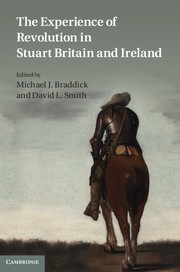Book contents
- Frontmatter
- Contents
- Notes on contributors
- Preface
- List of abbreviations
- JSM
- Introduction: John Morrill and the experience of revolution
- 1 The Scottish–English–Romish Book: the character of the Scottish Prayer Book of 1637
- 2 Popery in perfection? The experience of Catholicism: Henrietta Maria between private practice and public discourse
- 3 Sir Benjamin Rudyerd and England's ‘wars of religion’
- 4 Rhetoric and reality: images of Parliament as Great Council
- 5 Cathedrals and the British Revolution
- 6 History, liberty, reformation and the cause: Parliamentarian military and ideological escalation in 1643
- 7 Sacrilege and compromise: court divines and the king's conscience, 1642–1649
- 8 Law, liberty, and the English Civil War: John Lilburne's prison experience, the Levellers and freedom
- 9 On shaky ground: Quakers, Puritans, possession and high spirits
- 10 James Harrington's prescription for healing and settling
- 11 ‘The Great Trappaner of England’: Thomas Violet, Jews and crypto-Jews during the English Revolution and at the Restoration
- 12 The Cromwellian legacy of William Penn
- 13 Irish bishops, their biographers and the experience of revolution, 1656–1686
- 14 Religion and civil society: the place of the English Revolution in the development of political thought
- Bibliography of the major writings of John Morrill, 1967–2009
- Index
- References
2 - Popery in perfection? The experience of Catholicism: Henrietta Maria between private practice and public discourse
Published online by Cambridge University Press: 05 August 2011
- Frontmatter
- Contents
- Notes on contributors
- Preface
- List of abbreviations
- JSM
- Introduction: John Morrill and the experience of revolution
- 1 The Scottish–English–Romish Book: the character of the Scottish Prayer Book of 1637
- 2 Popery in perfection? The experience of Catholicism: Henrietta Maria between private practice and public discourse
- 3 Sir Benjamin Rudyerd and England's ‘wars of religion’
- 4 Rhetoric and reality: images of Parliament as Great Council
- 5 Cathedrals and the British Revolution
- 6 History, liberty, reformation and the cause: Parliamentarian military and ideological escalation in 1643
- 7 Sacrilege and compromise: court divines and the king's conscience, 1642–1649
- 8 Law, liberty, and the English Civil War: John Lilburne's prison experience, the Levellers and freedom
- 9 On shaky ground: Quakers, Puritans, possession and high spirits
- 10 James Harrington's prescription for healing and settling
- 11 ‘The Great Trappaner of England’: Thomas Violet, Jews and crypto-Jews during the English Revolution and at the Restoration
- 12 The Cromwellian legacy of William Penn
- 13 Irish bishops, their biographers and the experience of revolution, 1656–1686
- 14 Religion and civil society: the place of the English Revolution in the development of political thought
- Bibliography of the major writings of John Morrill, 1967–2009
- Index
- References
Summary
An important strand of recent work on the history of Catholicism has been an attempt to move beyond studies of martyrdom and survival, or of a deep-rooted collective anti-Catholicism, by concentrating instead on the possibilities of coexistence and practical toleration. Studies of the perception of religious difference and various forms of interaction across confessional boundaries in everyday life have demonstrated that religious coexistence was generally peaceful and characterized by pragmatism or even curiosity. This trend has been accompanied by a greater awareness of the fluidity of religious identities, even among the highly educated. This emphasis contrasts with an awareness of the successful revival and instrumentalization of anti-Catholic sentiments on the eve of the English Civil War, despite the evidence that anti-Catholicism does not seem to have been a powerful collective phenomenon during the 1630s.
Based on new research on the experiences and perceptions of religious differences in early modern Europe, this chapter will shed new light on the complex interdependencies of religious politics, the experience of religious differences in everyday life and anti-Catholic discourses in mid-seventeenth-century England. At its heart lies the question of why Queen Henrietta Maria came to stand for the threat of popery with such force that the traditions of practical coexistence were threatened. Essential for understanding this phenomenon are the terms of the marriage contract, whose impact has never been analysed.
- Type
- Chapter
- Information
- Publisher: Cambridge University PressPrint publication year: 2011



